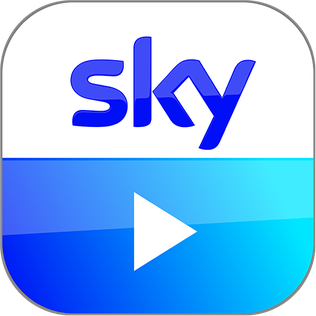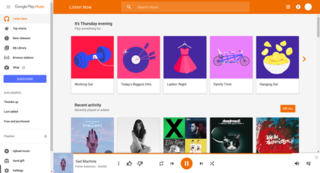
A mobile game, or smartphone game, is a video game that is typically played on a mobile phone. The term also refers to all games that are played on any portable device, including from mobile phone, tablet, PDA to handheld game console, portable media player or graphing calculator, with and without network availability. The earliest known game on a mobile phone was a Tetris variant on the Hagenuk MT-2000 device from 1994.
Mobile banking is a service provided by a bank or other financial institution that allows its customers to conduct financial transactions remotely using a mobile device such as a smartphone or tablet. Unlike the related internet banking it uses software, usually called an app, provided by the financial institution for the purpose. Mobile banking is usually available on a 24-hour basis. Some financial institutions have restrictions on which accounts may be accessed through mobile banking, as well as a limit on the amount that can be transacted. Mobile banking is dependent on the availability of an internet or data connection to the mobile device.
The term mobile commerce was originally coined in 1997 by Kevin Duffey at the launch of the Global Mobile Commerce Forum, to mean "the delivery of electronic commerce capabilities directly into the consumer’s hand, anywhere, via wireless technology." Many choose to think of Mobile Commerce as meaning "a retail outlet in your customer’s pocket."

Google Pay Send, previously known as Google Wallet, was a peer-to-peer payments service developed by Google before its merger into Google Pay. It allowed people to send and receive money from a mobile device or desktop computer.

NBA League Pass is the National Basketball Association's direct-to-consumer subscription-based product that gives basketball fans access to NBA games, live and on-demand, for the entire NBA season. League Pass is available to viewers in the United States and as an international package for all other countries. The pricing structure and services on offer are different, depending on where the viewer is located. A 7 day free trial is available for new subscribers everywhere.
Deezer is a French online music streaming service. It allows users to listen to music content from record labels, as well as podcasts on various devices online or offline.

Sky Go is a streaming television service from Sky Group provided free for Sky TV subscribers in the United Kingdom and Republic of Ireland, it complements Sky TV by allowing subscribers to watch live and on demand Sky TV via an internet connection on the go. The Sky Go app is available on Windows and Mac computers and also on Android and iOS devices.
Flipboard is a news aggregator and social network aggregation company based in Palo Alto, California, with offices in New York, Vancouver, and Bejiing. Its software, also known as Flipboard, was first released in July 2010. It aggregates content from social media, news feeds, photo sharing sites, and other websites, presents it in magazine format, and allows users to "flip" through the articles, images, and videos being shared. Readers can also save stories into Flipboard magazines. As of March 2016 the company claims there have been 28 million magazines created by users on Flipboard. The service can be accessed via web browser, or by a Flipboard application for Microsoft Windows and macOS, and via mobile apps for iOS and Android. The client software is available at no charge and is localized in 21 languages.

iCloud is a cloud-storage and cloud-computing service from Apple Inc. launched on October 12, 2011. As of 2018, the service had an estimated 850 million users, up from 782 million users in 2016.
An app store is a type of digital distribution platform for computer software called applications, often in a mobile context. Apps provide a specific set of functions which, by definition, do not include the running of the computer itself. Complex software designed for use on a personal computer, for example, may have a related app designed for use on a mobile device. Today apps are normally designed to run on a specific operating system—such as the contemporary iOS, macOS, Windows or Android—but in the past mobile carriers had their own portals for apps and related media content.
A mobile application or app is a computer program or software application designed to run on a mobile device such as a phone, tablet, or watch. Mobile applications often stand in contrast to desktop applications which are designed to run on desktop computers, and web applications which run in mobile web browsers rather than directly on the mobile device.
Google Play, also branded as the Google Play Store and formerly Android Market, is a digital distribution service operated and developed by Google. It serves as the official app store for certified devices running on the Android operating system and its derivatives as well as ChromeOS, allowing users to browse and download applications developed with the Android software development kit (SDK) and published through Google. Google Play has also served as a digital media store, offering games, music, books, movies, and television programs be. Content that has been purchased on Google Play Movies & TV and Google Play Books can be accessed on a web browser, and through the Android and iOS apps.
A digital newsstand is a digital distribution platform for downloadable newspapers, magazines and journals. Examples include Apple's Newsstand and Google Play Newsstand – both of which have been discontinued – Amazon Kindle Newsstand and Magzter. It is an online development of the traditional news stand.

Google Play Music is a discontinued music and podcast streaming service and an online music locker operated by Google as part of its Google Play line of services. The service was announced on May 10, 2011; after a six-month, invitation-only beta period, it was publicly launched on November 16, 2011 and shut down in December 2020.

Google Play Books, formerly Google eBooks, is an ebook digital distribution service operated by Google, part of its Google Play product line. Users can purchase and download ebooks and audiobooks from Google Play, which offers over five million titles, with Google claiming it to be the "largest ebooks collection in the world". Books can be read on a dedicated Books section on the Google Play website, through the use of a mobile app available for Android and iOS, through the use of select e-readers that offer support for Adobe Digital Editions, through a web browser and reading via Google Home. Users may also upload up to 2,000 ebooks in the PDF or EPUB file formats. Google Play Books is available in 75 countries.

Google Play Newsstand was a news aggregator and digital newsstand service by Google. On May 8, 2018, Google announced at Google I/O that Google Play Newsstand was being amalgamated with Google News. Launched in November 2013 through the merger of Google Play Magazines and Google Currents, the service let users subscribe to magazines and topical news feeds, receiving new issues and updates automatically. Content was offered for reading on a dedicated Newsstand section of the Google Play website or through the mobile apps for Android and iOS. Offline download and reading is supported on the mobile apps.

Google Play Pass is an app subscription service by Google for Android devices. It was launched on September 23, 2019 in the United States. In July 2020, the service launched as planned in other Western countries, including Germany, Australia, and Canada. Subscribers can access the included apps and games without ads and in-app purchases for a monthly or yearly subscription. There are over 460 curated titles available under the service, which range from puzzles to podcasts. In March 2022, Google Play Pass launched in India.

The popularisation of mobile games began as early as 1997 with the introduction of Snake preloaded on Nokia feature phones, demonstrating the practicality of games on these devices. Several mobile device manufacturers included preloaded games in the wake of Snake's success. In 1999, the introduction of the i-mode service in Japan allowed a wide variety of more advanced mobile games to be downloaded onto smartphones, though the service was largely limited to Japan. By the early 2000s, the technical specifications of Western handsets had also matured to the point where downloadable applications could be supported, but mainstream adoption continued to be hampered by market fragmentation between different devices, operating environments, and distributors.

Epic Games v. Apple is a lawsuit brought by Epic Games against Apple in August 2020 in the United States District Court for the Northern District of California, related to Apple's practices in the iOS App Store. Epic Games specifically had challenged Apple's restrictions on apps from having other in-app purchasing methods outside of the one offered by the App Store. Epic Games' founder Tim Sweeney had previously challenged the 30% revenue cut that Apple takes on each purchase made in the App Store, and with their game Fortnite, wanted to either bypass Apple or have Apple take less of a cut. Epic implemented changes in Fortnite intentionally on August 13, 2020, to bypass the App Store payment system, prompting Apple to block the game from the App Store and leading to Epic filing its lawsuit. Apple filed a countersuit, asserting Epic purposely breached its terms of contract with Apple to goad it into action, and defended itself from Epic's suit.
Google Wallet is a digital wallet platform developed by Google. It is available for the Android and Wear OS operating systems, and was announced on May 11, 2022, at the 2022 Google I/O keynote. It began rolling out on Android smartphones on July 18, co-existing with the 2020 Google Pay app and replacing the 2018 one.









